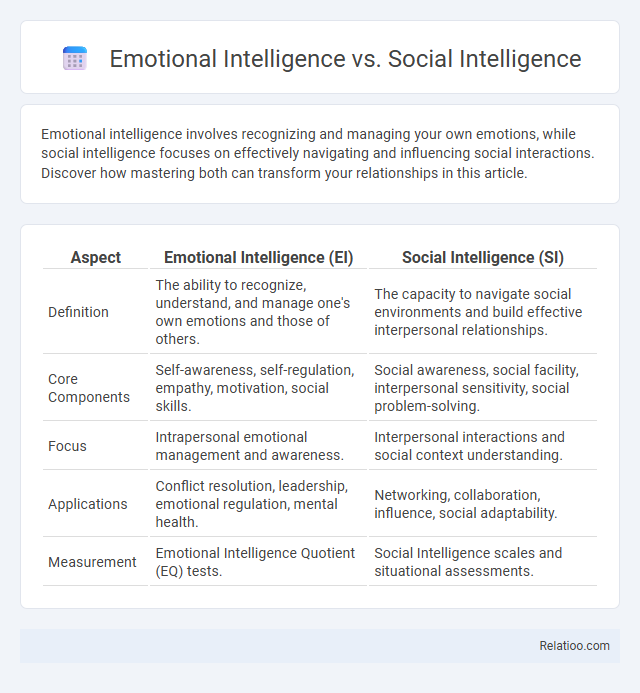Emotional intelligence involves recognizing and managing your own emotions, while social intelligence focuses on effectively navigating and influencing social interactions. Discover how mastering both can transform your relationships in this article.
Table of Comparison
| Aspect | Emotional Intelligence (EI) | Social Intelligence (SI) |
|---|---|---|
| Definition | The ability to recognize, understand, and manage one's own emotions and those of others. | The capacity to navigate social environments and build effective interpersonal relationships. |
| Core Components | Self-awareness, self-regulation, empathy, motivation, social skills. | Social awareness, social facility, interpersonal sensitivity, social problem-solving. |
| Focus | Intrapersonal emotional management and awareness. | Interpersonal interactions and social context understanding. |
| Applications | Conflict resolution, leadership, emotional regulation, mental health. | Networking, collaboration, influence, social adaptability. |
| Measurement | Emotional Intelligence Quotient (EQ) tests. | Social Intelligence scales and situational assessments. |
Understanding Emotional Intelligence
Emotional Intelligence involves recognizing, understanding, and managing your own emotions and those of others to foster effective communication and relationships. Social Intelligence emphasizes navigating social situations and building interpersonal connections through empathy and social awareness. Understanding Emotional Intelligence empowers you to enhance self-awareness and emotional regulation, leading to improved decision-making and personal growth.
Defining Social Intelligence
Social intelligence is the ability to understand and manage social interactions, recognizing social cues and effectively navigating complex relationships. Unlike emotional intelligence, which centers on recognizing and managing your own emotions and those of others, social intelligence emphasizes adapting behavior to social contexts and fostering meaningful connections. Mastering social intelligence enhances communication skills, empathy, and leadership capabilities in diverse social environments.
Core Components of Emotional Intelligence
Emotional Intelligence centers on core components such as self-awareness, self-regulation, empathy, motivation, and social skills, enabling individuals to recognize and manage their own emotions effectively. Social Intelligence primarily involves the ability to navigate social environments, understand social cues, and build relationships, closely linked but distinct from Emotional Intelligence. The differentiation between Emotional Intelligence and Social Intelligence lies in Emotional Intelligence's emphasis on internal emotional management, whereas Social Intelligence focuses on interpersonal interactions and social adaptability.
Key Elements of Social Intelligence
Social intelligence involves key elements such as social awareness, relationship management, and effective communication skills, enabling you to navigate social environments and understand group dynamics. Unlike emotional intelligence, which centers on recognizing and managing your own emotions, social intelligence emphasizes interpreting others' emotions and social cues to foster collaboration and influence. Mastery of social intelligence enhances your ability to build trust, resolve conflicts, and adapt behavior in diverse social contexts for better interpersonal outcomes.
Emotional Intelligence in Personal Development
Emotional Intelligence (EI) involves recognizing, understanding, and managing your own emotions, which is crucial for personal development and effective self-regulation. Social Intelligence centers on navigating social environments and understanding others' emotions, but Emotional Intelligence specifically enhances your self-awareness and empathy, laying the foundation for stronger relationships and better decision-making. Prioritizing Emotional Intelligence in personal growth improves your communication skills and resilience, empowering you to handle stress and conflicts more effectively.
Social Intelligence in Building Relationships
Social intelligence plays a crucial role in building relationships by enabling individuals to accurately perceive and respond to others' emotions, intentions, and social cues. Unlike emotional intelligence, which primarily involves managing one's own emotions, social intelligence emphasizes understanding group dynamics and fostering effective communication within social interactions. High social intelligence enhances empathy, conflict resolution, and collaboration, making it vital for developing trust and meaningful interpersonal connections.
Differences Between Emotional and Social Intelligence
Emotional intelligence refers to the ability to recognize, understand, and manage one's own emotions, while social intelligence involves effectively navigating social situations and understanding others' emotions and social cues. The primary difference lies in emotional intelligence focusing on internal emotional regulation and empathy, whereas social intelligence emphasizes interpersonal skills and social awareness. Mastery of emotional intelligence aids personal emotional control, whereas social intelligence enhances relationship-building and social adaptability.
Overlap and Interconnection: EI and SI
Emotional Intelligence (EI) and Social Intelligence (SI) overlap significantly, as both involve understanding and managing emotions to navigate interpersonal relationships effectively; EI focuses on recognizing and regulating one's own emotions, while SI emphasizes interpreting others' emotions and social cues. Your ability to combine EI and SI enhances communication, empathy, and conflict resolution by integrating emotional self-awareness with social awareness. The interconnection between these intelligences strengthens social adaptability, allowing you to build meaningful and resilient connections in diverse social environments.
Assessing and Measuring Emotional vs. Social Intelligence
Assessing emotional intelligence involves evaluating your ability to recognize, understand, and manage your own emotions as well as those of others, often using tools like the Emotional Quotient Inventory (EQ-i) or the Mayer-Salovey-Caruso Emotional Intelligence Test (MSCEIT). Social intelligence, on the other hand, is measured through your capacity to navigate social situations, interpret social cues, and build relationships, commonly assessed with instruments such as the Tromso Social Intelligence Scale (TSIS) or situational judgment tests. Understanding the distinction between emotional and social intelligence assessments helps you develop targeted strategies to enhance interpersonal skills and emotional awareness effectively.
Enhancing Emotional and Social Intelligence Skills
Enhancing emotional intelligence involves refining your ability to recognize, understand, and manage your own emotions, leading to better self-awareness and empathy. Developing social intelligence focuses on improving your capacity to navigate social environments, interpret others' behaviors, and build meaningful relationships. Prioritizing both emotional and social intelligence skills equips you with a comprehensive toolkit for effective communication, conflict resolution, and emotional resilience in personal and professional settings.

Infographic: Emotional Intelligence vs Social Intelligence
 relatioo.com
relatioo.com